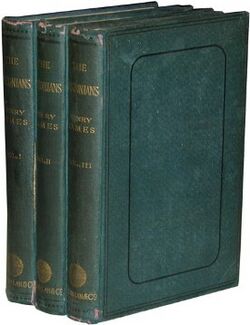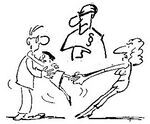| 12. Welttag der genitalen Selbstbestimmung am 7. Mai 2024 | 
|
| Marsch für das Leben in Berlin (und Köln), Termin: 21. September 2024, Ort: Brandenburger Tor, Uhrzeit: 13:00 Uhr - Info[ext] | 
|
| MediaWiki[wp] ist männerfeindlich, siehe T323956. |
Die Damen aus Boston
 Erstausgabe | |
| Buchdaten | |
|---|---|
| Titel | The Bostonians |
| Autor | Henry James[wp] |
| Verlag | Macmillan and Co., London |
| Erschienen | 16. Februar 1886 |
| Seiten | Band 1: 244, Band 2: 226, Band 3: 232 |
 Ausgabe KiWi (2017) | |
| Buchdaten | |
|---|---|
| Titel | Die Damen aus Boston |
| Autor | Henry James |
| Verlag | Kiepenheuer & Witsch/KiWi |
| Erschienen | 1964/2017 |
| ISBN | 3-462-40129-7 |
The Bostonians is a novel by Henry James[wp], first published as a serial in The Century Magazine[wp] in 1885-1886 and then as a book in 1886. This bittersweet tragicomedy[wp] centres on an odd triangle of characters: Basil Ransom, a political conservative from Mississippi; Olive Chancellor, Ransom's cousin and a Boston feminist; and Verena Tarrant, a pretty, young protégée of Olive's in the feminist movement. The storyline concerns the struggle between Ransom and Olive for Verena's allegiance and affection, though the novel also includes a wide panorama of political activists, newspaper people, and quirky eccentrics.
Publication
Henry James originally entered into an agreement with the Boston publisher James R. Osgood & Co. to publish the book in the United States for $4,000. Osgood made a separate agreement with The Century for the magazine to serialize the novel. In May 1885, before the serialization had finished and James had been paid any of the money owed to him, Osgood's firm went bankrupt.[1] James was able to recover part of the lost sum by selling the copyright to Macmillan and Co.[wp], which published The Bostonians in a three-volume edition in Britain in February 1886, and in a one-volume edition in the US in May 1886.[1] James was not, however, able to recover any money for the serialization in The Century.[2]
Plot summary
Mississippi lawyer and Civil War[wp] veteran, Basil Ransom, visits his cousin Olive Chancellor in Boston. She takes him to a political meeting where Verena Tarrant delivers a feminist speech. Ransom, a strong conservative, is annoyed by the speech but fascinated with the speaker. Olive, who has never before set eyes on Verena, is equally fascinated. She persuades Verena to leave her parents' house, move in with her and study in preparation for a career in the feminist movement. Meanwhile, Ransom returns to his law practice in New York, which is not doing well. He visits Boston again and walks with Verena through the Harvard College grounds, including the impressive Civil War Memorial Hall[wp]. Verena finds herself attracted to the charismatic Ransom.
Basil eventually proposes to Verena, much to Olive's dismay. Olive has arranged for Verena to speak at the Boston Music Hall[wp]. Ransom shows up at the hall just before Verena is scheduled to begin her speech. He persuades Verena to elope with him, to the discomfiture of Olive and her fellow-feminists. The final sentence of the novel shows Verena in tears - not to be her last, James assures us.
Themes
Unlike much of James' work, The Bostonians deals with explicitly political themes: feminism and the general role of women in society. James was at best ambivalent about the feminist movement, and the early chapters harshly satirise Olive and her fellow ideologues. Another theme in the book, much discussed recently, is Olive's possible lesbian attraction to Verena. (The term Boston marriage[wp] came to connote just such an ambiguous co-habiting long-term relationship between two women.) James is not explicit here, partially due to the conventions of the time. But this vagueness—because it creates possible ambiguity about Olive's motives—may, or may not, enrich the novel.
People divide over how to read the book. To some, as Ransom gets closer to winning Verena, he seems to lose at least some of his creator's sympathy; to others, none at all. To some, he becomes more sympathetic to Olive in the later chapters as she begins to lose Verena; to others, he merely observes her suffering. Some think her painful recognition of her situation somewhat similar to Isabel Archer's long nighttime meditation in chapter 42 of The Portrait of a Lady[wp]; others don't.
The three central characters are surrounded by a vivid supporting cast of would-be reformers, cynical journalists, and sometimes sinister hangers-on. James shows remarkable ability to create a broad cross-section of American society, which helps refute the charge that he could only handle small, closed-off bits of life.
The title refers, not to the people of Boston in general, but to the two characters Olive and Verena, "as they appeared to the mind of Ransom, the southerner, and outsider, looking at them from New York."[3]
Critical evaluation
The Bostonians was not well received by contemporary critics, especially in north America.[4] James himself once wrote an observation that The Bostonians had never, "even to my much-disciplined patience, received any sort of justice."[5] James' portrayal of Boston reformers was denounced as inaccurate and unfair, especially because some felt James had satirised actual persons in the novel. Darrel Abel observes that when the novel was first published in Century Magazine[wp] in 1885, the people of Boston were very displeased:
| Deutsche Übersetzung |
| Die Bostoner nahmen ihm seine Satire auf ihre intellektuellen und humanitären Bestrebungen übel. Sie ärgerten sich über die offensichtliche Sympathie des Autors mit seinem reaktionären Südstaaten-Helden - eine Sympathie, die sie vielleicht teilweise von den Briten übernommen hatten, die den Südstaaten-Gentleman mehr bewunderten als den Yankee-Reformer. Die Bostoner hielten Miss Birdseye für eine beleidigende Karikatur von Miss Elizabeth Peabody[wp], der Schwägerin von Hawthorne[wp], Mitarbeiterin von Alcott[wp] und Freundin von Emerson[wp], und damit für eine zu unantastbare Persönlichkeit, um sie in ein humorvolles Licht zu rücken. Am meisten aber verletzte das Porträt von Olive Chancellor den Bostoner Anstand, denn es enthielt unmissverständliche Anzeichen von Lesbianismus, was es zu einem Verstoß gegen den Bostoner Anstand und die Zurückhaltung machte. [anm 1] |
| Englisches Original |
| The Bostonians resented its satire upon their intellectual and humanitary aspirations. They resented the author's evident sympathy with his reactionary Southern hero – a sympathy perhaps partly picked up from the British, who admired the Southern gentleman more than the Yankee reformer. The Bostonians considered Miss Birdseye an insulting caricature of Miss Elizabeth Peabody, the sister-in-law of Hawthorne, associate of Alcott, and friend of Emerson, and therefore too sacrosanct a personage to be placed in a humorous light. But probably most offensive to Boston propriety were the unmistakable indications of Lesbianism in the portrait of Olive Chancellor, which made it a violation of Boston decency and reticence. [6] |
Horace Scudder[wp] reviewed the book in 1886, calling it an unfair treatment of characters whom the author simply did not like, although James had a definite interest in them:
| Deutsche Übersetzung |
| Wenn wir sagen, dass die meisten Figuren abstoßend sind, halten wir einfach die Wirkung fest, die sie auf den Leser aufgrund der Haltung haben, die der Autor ihnen gegenüber einnimmt. Er liebt sie nicht. Warum sollte er mehr von uns verlangen? Da er sich aber außerordentlich für sie interessiert und nicht müde wird, sie in jedes mögliche Licht zu rücken, geben wir diesem Interesse nach und entwickeln, wenn wir Zeit genug haben, eine außerordentliche Vertrautheit mit allen Beteiligten. Wenn dieses Interesse Mr. James dazu bringt, seine Figuren zu nahe an den Rand der Natur zu treiben, treten wir zurück und weigern uns, ihm zu folgen. [anm 1] |
| Englisches Original |
| When we say that most of the characters are repellent, we are simply recording the effect which they produce upon the reader by reason of the attitude which the author of their being takes toward them. He does not love them. Why should he ask more of us? But since he is extremely interested in them, and seems never wearied of setting them in every possible light, we also accede to this interest, and if we have time enough strike up an extraordinary intimacy with all parties. It is when this interest leads Mr. James to push his characters too near the brink of nature that we step back and decline to follow. [7] |
Mark Twain[wp] vowed that he would rather be damned to John Bunyan's[wp] heaven than read the book.[8] The letter in which Twain wrote this remark also contains invectives against the works of George Eliot[wp] and Nathaniel Hawthorne[wp]. Albert Bigelow Paine[wp] wrote in his annotation, "It is as easy to understand Mark Twain's enjoyment of Indian Summer[wp] as his revolt against Daniel Deronda[wp] and The Bostonians. He cared little for writing that did not convey its purpose in the simplest and most direct terms."[9]
Rebecca West[wp] described the book, in her biography of Henry James, as "a foolish song set to a good tune in the way it fails to 'come off.'" She praised the book's language and themes, but thought the book's political content was strained and unnecessary; she believed that James, by emphasising the political aspects of the subject matter, had inadvertently distracted the reader from what he actually had set out to say: "The pioneers who wanted to raise the small silvery song of art had to tempt their audiences somehow from the big brass band of America's political movements."[10]
Some later critics, though uncomfortable with what they think the novel's rather static nature and perhaps excessive length, have found more to praise in James' account of the contest for Verena and his description of the wider background of feminism and other reform movements.[11] Edmund Wilson[wp] wrote in 1938, in his book The Triple Thinkers: Ten Essays on Literature, "The first hundred pages of The Bostonians, with the arrival of the young Southerner in Boston and his first contacts with the Boston reformers, is, in its way, one of the most masterly things that Henry James ever did."[12] The quiet but significant struggle between Olive Chancellor and Basil Ransom does seem more pertinent and engrossing today than it might have appeared to 19th century readers, because it records the struggles of a historical period that has had, we can now see, a profound impact upon the kind of country America has become.[13]
F. R. Leavis[wp] praised the book as "one of the two most brilliant novels in the language," the other being James's The Portrait of a Lady[wp].[14] Leavis described it as "wonderfully rich, intelligent and brilliant ... It could have been written only by James, and it has an overt richness of life such as is not commonly associated with him."[15]
James bemoaned the adverse effect that this novel and The Princess Casamassima[wp] (published in the same year) had on his critical fortunes. Although he didn't turn away from political themes completely, he never again gave political ideas such a prominent place in his fiction.
According to Henry James' 'Notebooks', the "initial idea" of 'The Bostonians' came from Alphonse Daudet's[wp] novel The Evangelist, also about an evangelical older woman who draws a young woman under her sway to serve her cause (religion, rather than suffrage).[16]
Einzelnachweise
- Robert Gale: A Henry James Encyclopedia, Greenwood Press, 1989, ISBN 0-313-25846-5
- Edward Wagenknecht[wp]: The Novels of Henry James, Frederick Ungar Publishing Co., 1983, ISBN 0-8044-2959-6
- Anmerkungen
Querverweise
- Boston Marriage[wp] ("Bostoner Ehe")
- Die Damen aus Boston (Film)
Netzverweise
- Die englischsprachige Wikipedia führt einen Artikel über The Bostonians (Diesen Artikel gibt es in der deutschsprachigen Wikipedia [noch] nicht.)
- Original magazine publication of The Bostonians (1885-86)
- First book version of The Bostonians (1886)
- Note on the various texts of The Bostonians at the Library of America web site
- Janice Fiamengo: Nineteenth-Century Novelist Henry James Predicted Twentieth-Century Feminism, Studio-Brulé-Blog am 10. Mai 2022
 Nineteenth-Century Novelist Henry James Predicted Twentieth-Century Feminism - Studio B (5. Mai 2022) (Länge: 19:12 Min.)
Nineteenth-Century Novelist Henry James Predicted Twentieth-Century Feminism - Studio B (5. Mai 2022) (Länge: 19:12 Min.)- Deutsch: Der Romancier Henry James sagte den Feminismus des zwanzigsten Jahrhunderts voraus, WikiMANNia-Blog am 11. Mai 2022

